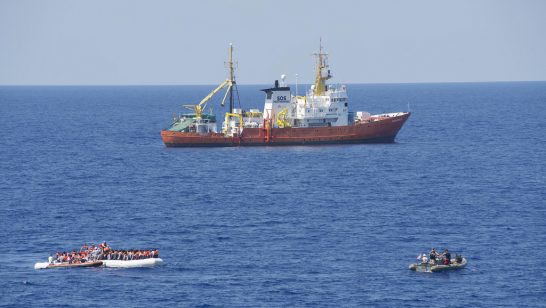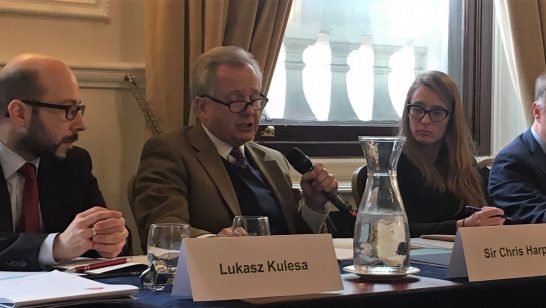
European frustration with Washington has seemingly reached a new high following the announcement that the United States will unilaterally withdraw from the international nuclear agreement with Iran. European leaders, who spent the last several months urging the U.S. president to remain in the deal, are now planning for a policy package to salvage it. This could exacerbate tensions across the Atlantic. Coming at the tail end of other divisive issues such as the Paris climate accord, defence spending and the newly imposed tariffs on European steel and aluminium exports, Trump’s decision increases the pressure on the already strained relationship.
But what will this challenge to transatlantic unity mean in practice?
The transatlantic partnership faces no imminent collapse, but the current disagreements may well usher in a period of “new normal” characterised by long-term erosion of trust and mutual suspicion. While such sentiments are not unequivocally the result of Trump’s foreign policy decisions, his actions have generated a level of frustration in a number of European countries that will not be easily overcome.
In this sense, the answer to the question comes in two parts.
Firstly, neither side wants the disagreement over Iran to affect other areas of the relationship. On the U.S. side – perhaps, admittedly, with the notable exception of the president and some of his closest advisers – there is a great deal of concern for the transatlantic partnership and a realisation of how mutually important it is. Congress in particular, despite a widespread loathe of the Iranian regime, remains sensitive to the European position.
Similarly, on the European side, the prevailing attitude among the foreign ministries in London, Berlin and Paris is one of pragmatism. Diplomats will likely seek to “compartmentalise” and contain the disagreement rather than letting it spill over into other areas of cooperation. Despite its contribution to hard security in theatres of operation such as Afghanistan and Syria, Europe is heavily dependent on the U.S. for cooperation on security and will remain so for the foreseeable future.
This puts into perspective the rather measured response to Trump’s announcement from some European leaders, such as the joint declaration of “regret and concern” by the leaders of France, Germany, and the United Kingdom, and Emmanuel Macron’s assurances that he “won’t start a strategic trade war against the U.S. about Iran.”
Secondly, there is no hiding the fact that the current rift in transatlantic relations is serious.
Security is at the very heart of the transatlantic relationship, and from a security perspective, Trump’s decision to torpedo the Iran deal is a punch below the belt. Europe is closer to the Middle East and will feel the repercussions from instability there more directly than the United States. The nuclear negotiations with Iran were largely seen as a European initiative and in a broader sense, the diverging views over the JCPOA illustrate a fundamental difference in foreign policy philosophy – Europe’s win-win approach versus the zero-sum politics currently pursued by Washington.
In a thousand small ways, therefore, the Europeans might start reconsidering the very foundations of the relationship with Washington – and that could have real consequences. As Donald Tusk, the President of the European Council, responded to Trump’s announcement, “with friends like that who needs enemies…We realise that if you need a helping hand, you will find one at the end of your arm.”
So how might Europeans respond to this situation?
In terms of policy towards the Middle East, we might see a growing difference between Europe and the U.S. While there will undoubtedly be continued coordination by primarily France and the UK with the U.S., there are now a number of areas where the two sides no longer see eye to eye. In particular, Trump’s decision might provoke a stronger effort by the Europeans to balance between Iran and Saudi Arabia in the region. They may also distance themselves further from coordination on Israel. Most European ambassadors in Israel boycotted the gala reception, which marked the opening of the U.S. Embassy in Jerusalem.
Coordination of Russia policy is not immune either. While the United States and Europe have so far presented a united front against belligerent Russian activities, the dissonance over the severity of sanctions is growing. With the new Russophile political forces in Italy on the one hand, and the anti-Russia rhetoric surrounding the upcoming mid-term election race in the States on the other, keeping EU unity over its Russia policy will become more challenging.
Global non-proliferation initiatives will suffer as well. The readiness of the U.S. to walk away from their commitment signals a troubling trend of moving away from multilateral diplomacy as the main tool of foreign policy towards coercive sanctioning. And Europe will find itself distancing even further on issues such as nuclear disarmament, arms control and nuclear security dialogue. These are all discouraging scenarios for a transatlantic divergence.
Finally, in terms of European defence, this will certainly add water to the mills of the debate over strategic autonomy and add a sense of urgency to the question of increased defence spending in Europe. More broadly, it will feed the narrative that Europe, as Angela Merkel put it, “truly have to take our fate into our own hands.”
While this sounds dramatic, it need not be destabilising. As our colleagues have recently argued, concrete European steps towards greater strategic autonomy, if done correctly and in coordination with the United States, could strengthen rather than weaken the transatlantic partnership. Moreover, a credible European commitment to provide better for its own security could signal to Washington that Europe is willing to go beyond mere rhetoric in order to protect its interests in international affairs. This would also put Europe in a stronger position to push back when those interests are being threatened.
The rift in transatlantic relations should therefore serve as a wakeup call for European leaders. Crucially, they should not respond by distancing themselves from the United States, but by coordinating closely with their American allies where possible while credibly demonstrating that they are willing to take on a greater share of responsibility for regional and international security. This would have the dual benefit of maintaining transatlantic unity while gradually improving the ability of European leaders to vigorously stand up for and defend their interests.
The opinions articulated above also do not necessarily reflect the position of the European Leadership Network or any of its members. The ELN’s aim is to encourage debates that will help develop Europe’s capacity to address pressing foreign, defence, and security challenges.




